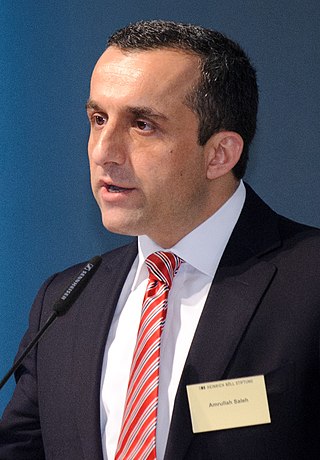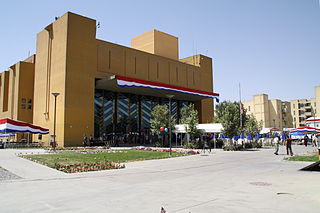
Hamid Karzai is an Afghan statesman who served as the fourth President of Afghanistan from July 2002 to September 2014, including as the first elected president of the Islamic Republic of Afghanistan from December 2004 to September 2014. He previously served as Chairman of the Afghan Interim Administration from December 2001 to July 2002. He is the chief (khān) of the Popalzai Durrani tribe of Pashtuns in Kandahar Province.

Gulbuddin Hekmatyar is an Afghan politician, former mujahideen leader and drug trafficker. He is the founder and current leader of the Hezb-e-Islami Gulbuddin political party, so called after Mohammad Yunus Khalis split from Hezbi Islami in 1979 to found Hezb-i Islami Khalis. He has twice served as Prime Minister during the 1990s.

Mohammad Qasim Fahim was a military commander and politician in Afghanistan who served as Vice President from June 2002 until December 2004 and from November 2009 until his death. He was considered a powerful and influential figure during the Karzai Administration.

Ahmed Wali Karzai was a politician in Afghanistan who served as Chairman of the Kandahar Provincial Council from 2005 until his death. He was the younger paternal half-brother of former Afghan President Hamid Karzai and an elder of the Popalzai tribe. Wali Karzai formerly lived in the United States, where he managed a restaurant owned by his family. He returned to Afghanistan following the removal of the Taliban government in late 2001. He has been accused of political corruption and was allegedly on the CIA payroll. He was assassinated by one of his close bodyguards, Sardar Mohammad, on 12 July 2011.

Presidential elections were held in Afghanistan on October 9, 2004. Hamid Karzai won the elections with 55.4% of the vote and three times more votes than any other candidate. Twelve candidates received less than 1% of the vote. It is estimated that more than three-quarters of Afghanistan's nearly 12 million registered voters cast ballots. The elections were overseen by the Joint Electoral Management Body, chaired by Zakim Shah and vice-chaired by Ray Kennedy, an American working for the United Nations.

The Northern Alliance, officially known as the United Islamic National Front for the Salvation of Afghanistan, was a military alliance of groups that operated between late 1996 to 2001 after the Islamic Emirate of Afghanistan (Taliban) took over Kabul. The United Front was originally assembled by key leaders of the Islamic State of Afghanistan, particularly president Burhanuddin Rabbani and former Defense Minister Ahmad Shah Massoud. Initially it included mostly Tajiks but by 2000, leaders of other ethnic groups had joined the Northern Alliance. This included Karim Khalili, Abdul Rashid Dostum, Abdullah Abdullah, Mohammad Mohaqiq, Abdul Qadir, Asif Mohseni, Amrullah Saleh and others.

Pakistan and state-sponsored terrorism refers to the involvement of Pakistan in terrorism through the backing of various designated terrorist organizations. Pakistan has been frequently accused by various countries, including its neighbours Afghanistan, India, and Iran, as well as by the United States, the United Kingdom, Germany, and France, of involvement in a variety of terrorist activities in both its local region of South Asia and beyond. Pakistan's northwestern tribal regions along the Afghanistan–Pakistan border have been described as an effective safe haven for terrorists by Western media and the United States Secretary of Defense, while India has accused Pakistan of perpetuating the insurgency in Jammu and Kashmir by providing financial support and armaments to militant groups, as well as by sending state-trained terrorists across the Line of Control and de jure India–Pakistan border to launch attacks in Indian-administered Kashmir and India proper, respectively. According to an analysis published by the Saban Center for Middle East Policy at the Brookings Institution in 2008, Pakistan was reportedly, "with the possible exception of Iran, perhaps the world's most active sponsor of terrorist groups... aiding these groups that pose a direct threat to the United States. Pakistan's active participation has caused thousands of deaths in the region; all these years Pakistan has been supportive to several terrorist groups despite several stern warnings from the international community." Daniel Byman, a professor and senior analyst of terrorism and security at the Center For Middle East Policy, also wrote that, "Pakistan is probably 2008's most active sponsor of terrorism". In 2018, the former Prime Minister of Pakistan, Nawaz Sharif, suggested that the Pakistani government played a role in the 2008 Mumbai attacks that were carried out by Lashkar-e-Taiba, a Pakistan-based Islamist terrorist group. In July 2019, Pakistani Prime Minister Imran Khan, on an official visit to the United States, acknowledged the presence of some 30,000–40,000 armed terrorists operating on Pakistani soil. He further stated that previous administrations were hiding this truth, particularly from the United States, for the last 15 years during the War on Terror.
Jawed Ludin is the Deputy Foreign Minister on Political Affairs. He was appointed on 2011, by President Hamid Karzai. He was Ambassador of Afghanistan in Canada from 2009 to 2012, and had been Spokesperson and later Chief of Staff to President Karzai.

The Karzai administration was the government of Afghanistan under President Hamid Karzai, who became the head of state of Afghanistan in December 2001 after the Taliban government was overthrown. Karzai was appointed at the 2002 Loya Jirga as the Interim President of the Afghan Transitional Administration. After the 2004 Afghan presidential election, he became the President of Afghanistan.

Amrullah Saleh is an Afghan politician who served as the first vice president of Afghanistan from February 2020 to August 2021, and acting interior minister from 2018 to 2019. He was the head of the National Directorate of Security (NDS) from 2004 to 2010.

The Afghan conflict, also called the Afghan crisis or Instability in Afghanistan is a series of events and wars that have kept Afghanistan in a near-continuous state of armed conflict since the 1970's. The country's instability began after the collapse of the Kingdom of Afghanistan in the 1973 coup d'état; with the overthrow of Afghan monarch Mohammad Zahir Shah, who reigned for almost forty years, Afghanistan’s relatively peaceful period in modern history came to an end. The triggering event for the first major war in Afghanistan during this period was the Saur Revolution of 1978, which overthrew the Republic of Afghanistan and established the Democratic Republic of Afghanistan. Rampant post-revolution fighting across the country ultimately led to a pro-government military intervention by the Soviet Union, sparking the Soviet–Afghan War in the 1980s.
Events from the year 2011 in Afghanistan.

Ghulam Haider Hamidi was the Mayor of Kandahar in Afghanistan. During Taliban rule, his family fled to Pakistan, then to the United States.
2003 in Afghanistan. A list of notable incidents in Afghanistan during 2003

The 2011 Afghanistan Ashura bombings were a pair of bombings in the Afghan capital of Kabul and Mazar-e-Sharif. The Kabul suicide bombing took place at around noon local time, on the day when Muslims commemorate Ashura, an annual holy day throughout the Muslim world particularly by the Shi'a Muslims.

The Inter-Services Intelligence (ISI) intelligence agency of Pakistan has been accused of being heavily involved in covertly running military intelligence programs in Afghanistan since before the Soviet invasion of Afghanistan in 1979. The first ISI operation in Afghanistan took place in 1975. It was in "retaliation to Republic of Afghanistan's proxy war and support to the militants against Pakistan". Before 1975, ISI did not conduct any operation in Afghanistan and it was only after decade of Republic of Afghanistan's proxy war against Pakistan, support to militants and armed incursion in 1960 and 1961 in Bajaur that Pakistan was forced to retaliate. Later on, in the 1980s, the ISI in Operation Cyclone systematically coordinated the distribution of arms and financial means provided by the United States Central Intelligence Agency (CIA) to factions of the Afghan mujahideen such as the Hezb-e Islami (HeI) of Gulbuddin Hekmatyar and the forces of Ahmad Shah Massoud whose forces would later be known as the Northern Alliance. After the Soviet retreat, the different Mujahideen factions turned on each other and were unable to come to a power sharing deal which resulted in a civil war. The United States, along with the ISI and the Pakistani government of Prime Minister Benazir Bhutto became the primary source of support for Hekmatyar in his 1992–1994 bombardment campaign against the Islamic State of Afghanistan and the capital Kabul.

The April 2012 Afghanistan attacks took place on Sunday, 15 April 2012, at around 13:00 local time when heavily armed Taliban insurgents and suicide bombers launched multiple coordinated attacks throughout Afghanistan. Insurgents launched the 2012 spring offensive on multiple locations, including government buildings, military bases, and embassies. Attacks occurred in four Afghan provinces, including Kabul and Paktia. Different reports attribute responsibility for the attacks to either Taliban or the Haqqani network although the Taliban have claimed responsibility.
Waheed Muzdha was a senior Afghan political analyst, writer and a peace activist. He was also a poet and wrote several anti-Soviet poetry during the Soviet Afghan war. He was widely cited by various international newspapers for his views on Afghan conflict. During his career, Muzhda criticized both the Taliban and the Afghan government. Muzhda was praised as a probing intellectual by many journalists and scholars. He was assassinated on 20 November 2019 in Kabul. Several political observers and experts believe that Muzhda was assassinated for his views by pro-government groups as 'a part of campaign to silence people with different views'. Previously, he was reported to have been arrested by Afghan intelligence agency NDS.














